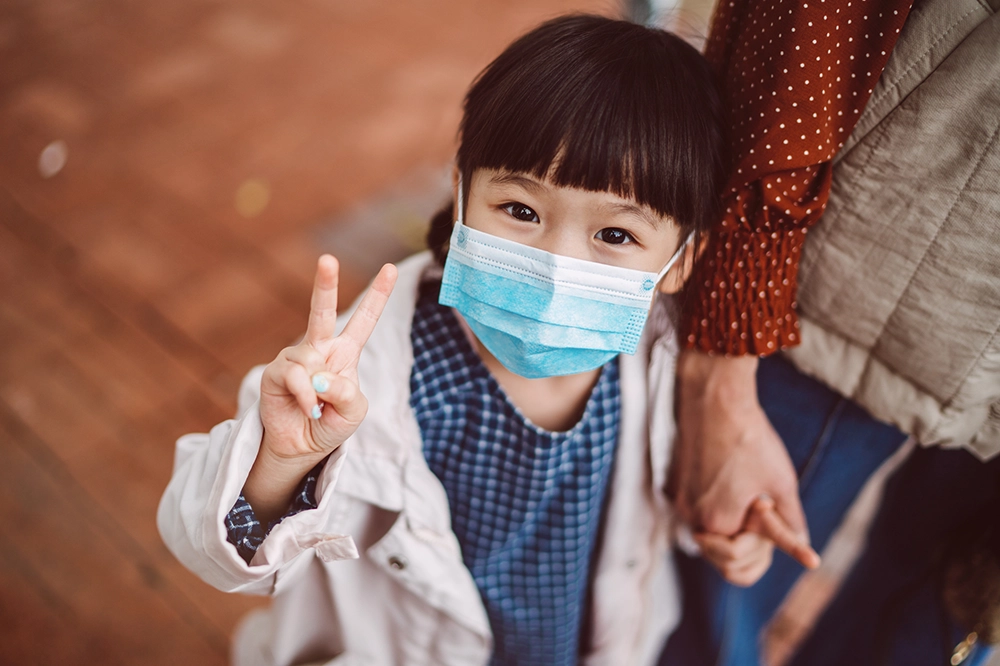Topics
Today, the terms "Influenza", "COVID-19", and "RSV" have become part and parcel of our daily lexicon. Besides being used interchangeably, what do these medical terms actually mean?
This article aims to break down key differences between the three and provide information you need to protect yourself and your children from these common respiratory illnesses.
What is the Difference Between Influenza, COVID-19, and RSV?
Influenza, Coronavirus disease (COVID-19), and Respiratory Syncytial Virus (RSV) are respiratory illnesses that present with common symptoms like fever, cough, and fatigue. It can be challenging to determine the virus responsible for your illness due to the high number of circulating viruses.
That said, these respiratory illnesses are different in terms of causes, symptoms, and treatment requirements. Let's understand how.
Flu (influenza) |
COVID-19 |
RSV |
| The flu is caused by Influenza viruses that infect the nose, throat and sometimes the lungs. | COVID-19 is caused by the SARS-CoV-2 Virus. | RSV is caused by the Respiratory Syncytial Virus. |
What Are the Symptoms of Influenza, COVID-19, and RSV?
The symptoms of flu (Influenza), COVID-19, and RSV may be similar but also have some differences.
✓ Rarely
✓✓ Sometimes
✓✓✓ Often
| Common symptoms | Influenza | COVID-19 | RSV |
| Fever | ✓✓✓ | ✓✓ | ✓✓ |
| Cough | ✓✓✓ | ✓✓✓ | ✓✓✓ |
| Wheezing | ✓ | ✓ | ✓✓✓ |
| Sore throat | ✓✓ | ✓✓✓ | ✓ |
| Runny / stuffed nose | ✓✓✓ | ✓✓✓ | ✓✓✓ |
| Shortness of breath/difficulty breathing | ✓ | ✓✓✓ | ✓ |
| Fatigue (tiredness) | ✓✓✓ | ✓✓✓ | ✓ |
| Muscle or body aches | ✓✓✓ | ✓✓ | ✓ |
| Loss of taste or smell | ✓ | ✓✓ | ✓ |
| Nausea/vomiting | ✓✓ | ✓✓ | ✓ |
| Diarrhoea | ✓✓ | ✓✓ | ✓ |
Is It Possible to Have the Flu, COVID-19, and RSV at the Same Time?
Yes. Some studies report that it is possible to have multiple respiratory illnesses simultaneously, including the flu, COVID-19, and RSV.
However, co-infection with these viruses needs to be better documented, and more research is required to determine the chances of co-occurrence.
How to Tell Which Respiratory Illness My Child Has?
Determining which respiratory illness a child has can be challenging, as the symptoms can be similar. Here are some steps to help you determine the infection your child may have:
- Observe the symptoms: Pay attention to your child's symptoms, such as fever, cough, shortness of breath, and wheezing.
- Consult a doctor: A doctor can examine your child and help determine his or her illness. Sometimes, a diagnostic test may be necessary to confirm the condition.
- Look for any known exposure: If you or your child have been in close contact with someone diagnosed with a specific respiratory illness, such as the flu or COVID-19, mentioning this to your doctor may be helpful.
How Is Influenza, COVID-19, or RSV Diagnosed?
COVID-19, Influenza, and RSV combined test
Tests that detect multiple respiratory viruses like COVID-19, flu, and RSV from one sample exist.
At-home test kits are available for some respiratory illnesses, including COVID-19 and the flu. These kits usually require collecting a nasal or throat swab. They often use molecular techniques or rapid antigen tests to detect the presence of Influenza or the SARS-CoV-2 virus.
Rapid antigen tests may provide results in minutes, while molecular tests may take a few hours to a few days.
However, it is essential to note that at-home test kits for respiratory illnesses may have limitations. They may be less accurate than tests performed by doctors and may not be appropriate for everyone.
Suppose there is any doubt about the accuracy of a negative result from a home COVID-19 test, and you suspect you might have the virus. In that case, it is advisable to visit a clinic and undergo a molecular test (for example PCR test) for confirmation.
Molecular tests utilise molecular techniques such as polymerase chain reaction (PCR) to detect the presence of several different respiratory viruses in a single test. These tests can quickly identify the cause of respiratory illness, even if multiple viruses are present.
What Are the Treatment Options for Influenza, COVID-19, and RSV?
The treatments for Influenza, COVID-19, and RSV vary depending on the illness and the severity of symptoms.
Here is a summary of the general treatments recommended by reputable organisations such as the Centers for Disease Control and Prevention (CDC) and the World Health Organisation (WHO).
- Influenza (flu): Antiviral medications and symptomatic treatment using painkillers such as paracetamol relieve fever, aches, and pains. Plenty of rest and staying hydrated are also important.
- COVID-19: For mild cases, symptomatic treatment includes rest, hydration, and over-the-counter medications to alleviate symptoms. Severe cases may require hospitalisation, and patients may need oxygen therapy or mechanical ventilation in extreme cases. Antiviral medications are available for the treatment of severe or critical COVID-19 cases.
- RSV: There is no specific antiviral treatment for RSV. Supportive care is the main approach, including adequate hydration and managing fever and pain. Severe cases, especially in infants and young children, may require hospitalisation for respiratory support.
How Can I Protect My Children from Influenza, COVID-19, and RSV?
There are several steps you can take to help protect your children from Influenza, COVID-19, and RSV:
-
Vaccination:
Ensure your children receive the recommended vaccines, including Influenza, COVID-19 (if eligible based on age), and any other vaccinations recommended by healthcare providers. Stay up-to-date with annual flu vaccinations. -
Hand hygiene:
Encourage your children to wash their hands regularly with soap and water for at least 20 seconds, especially after blowing their nose or touching contaminated surfaces and before meals. -
Avoid close contact with sick individuals:
Limit close contact with individuals who are sick. Encourage children to avoid touching their faces, especially their eyes, nose, and mouth. -
Masks:
While masks became the norm during the COVID-19 surge months, it is recommended that they continue to be used. Encourage your children to do so, especially when in crowded places. -
Ventilation:
Ensure good ventilation in indoor spaces to reduce the concentration of respiratory droplets. -
Healthy habits:
Encourage a healthy lifestyle with a balanced diet, regular exercise, and adequate sleep to support overall immune health.
Make an Appointment at Pantai Hospitals
Understanding the differences between Influenza, COVID-19, and RSV is important in preventing and controlling the spread of these respiratory illnesses. The best way to protect yourself and your children is to get vaccinated, practice good hand hygiene, and avoid close contact with sick individuals.
If you or your children experience continuous symptoms of a respiratory illness, it is best to seek medical attention as soon as possible.
A dedicated and expert team of Paediatric specialists at Pantai Hospital is available for consultation to provide the best care and assistance to patients through screening, diagnosis, and treatment.
Get in touch with us to book an appointment today if you have any concerns or questions about respiratory illnesses in children.
Pantai Hospital has been accredited by the Malaysian Society for Quality in Health (MSQH) for its commitment to patient safety and service quality.






.tmb-ph800x600.webp?Culture=en&sfvrsn=58cabd72_4)





